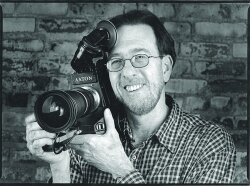One-man band: McElwee persists in first-person documentary
In the mid-1980s, filmmaker Ross McElwee considered shooting a documentary about General Sherman’s march through the South. And he did shoot a documentary following Sherman’s trail, but in wholly unexpected ways. McElwee’s Sherman’s March became a droll account of his own romantic misfires, everyday upsets, and encounters with distinctly Southern characters.
The 1986 film’s intensely intimate style arose from McElwee’s one-man band approach. The participant in the upcoming Virginia Film Festival was the film’s protagonist, narrator, and entire crew.
Filming one-on-one “enables a sort of spontaneity to occur, and also makes the people who are being filmed often much more relaxed,” McElwee, 65, explains. “You don’t have a large phalanx of equipment sort of staring at you during production.”
McElwee also dismissed the documentary film genre’s conventions and veered off in a new direction with Bright Leaves, his 2003 film about his own family's multi-layered tragic connections to the tobacco industry.
“I felt a strong compulsion to try to make it more subjective," says McElwee. "I didn’t understand why it was necessary for the filmmaker to remain invisible behind the camera.
Documentary narration has long been expected to be “factual, rational, and objective," but McElwee's voice-over can turn comic or mordant. In the post 9/11 digital landscape, McElwee says, films like Sherman’s March are technologically far easier to make, but other aspects are much more difficult.
“There are scenes in Sherman’s March where I just walk into shopping centers and start filming,” he observes. “You cannot do that anymore.”
YouTube, he says, has increased people’s wariness about being filmed, and surveillance is "everywhere,” along with guards instructed to prevent public filming.
However, McElwee, who has taught filmmaking at Harvard since 1986, continues to make documentaries.
“We are thrilled to welcome Ross McElwee back to the Virginia Film Festival for his latest documentary, Photographic Memory,” says festival director Jody Kielbasa. “It is particularly meaningful for us because the last time he was here, he brought his son Adrian, who was then a young boy. Now with this film, which deals with his and Adrian's relationship, they both return again.”
In Photographic Memory, McElwee revisits an area in France that powerfully affected him during adolescence. “I chose that title because it had that kind of irony to it,” McElwee says, “but also because the film is a meditation on the differences between still photography and filmmaking, and it’s a meditation on the difference between the analog era and the digital era.”
Ironically, McElwee recently optioned Sherman’s March for a new film adaptation...on the condition that he could film a documentary about the new film’s production. He would be filming filmmakers filming a recreation of himself...filming.
McElwee’s iconoclasm marches on.
Ross McElwee will host a screening of Sherman’s March on Saturday, November 3, at 5:15pm at the Regal 4 on the Downtown Mall, and of Photographic Memory on Sunday, November 4 at 5pm at Vinegar Hill.
